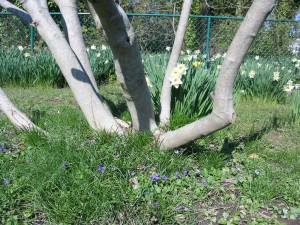 Yesterday when I heard there was snowfall in the forecast for the night, I looked out the back door at the mess of daffodils against the back fence, worried that the snow would kill the last of them before I was ready for them to go. Then I noticed a patch of purple flowers in front of the daffodils.
Yesterday when I heard there was snowfall in the forecast for the night, I looked out the back door at the mess of daffodils against the back fence, worried that the snow would kill the last of them before I was ready for them to go. Then I noticed a patch of purple flowers in front of the daffodils.
And, as I hoped in the moments it took to cross the yard, they were violets.
I remembered writing this – three years ago, when I still lived in the desert and didn’t know if I would end up living where violets would grow in my own yard. My soul-deep love for violets goes way back.
In our yard there were two patches of violets, neither of them bigger than an area rug in an average sized room. The green carpet of their leaves sent firm stems upward and out, and their blossoms reached just above the heart-shaped leaves.
I sat on my heels as I worked from one side of the violet patch and across to the other side of it, so that I wouldn’t crush the flowers. I tugged and bent each stem until it snapped, and then added it to the growing bunch of violets in my other hand. I left only leaves behind.
Away from me, the lawn mower droned and sputtered as my father made wide turns around the perimeter of the hill next to the house. I had time. But soon, he would head to this part of the yard that was sheltered by trees. The grass grew in thick patches in a few spots, but was spare across the rest of the yard in front of the house and along one side, defeated by the rocky Missouri soil and the shade of sassafras and oak trees.
Around me, the air held the hum and static of bees and mosquitoes and gnats. Sunlight reached down like an ellipsis. Tentative, mild, filtered by the leaves, leaving enough shade for the violets to grow.
I worked quickly, first picking clean the patch at the edge of the yard, nearest the approaching mower, then moving on to the other patch near the red-handled water pump. I wanted them all. To leave even one or two blossoms to be mowed down and spit out of the side of the mower, ground into nothing, seemed unbearable to me.
It was a ritual, this. A mission of mercy and salvation for the violets. And for me, a small and declarative act of preservation.
If no one collected the violets, they were lost, their loveliness destroyed in less than a minute. I couldn’t stand it. (It wasn’t until years later that I found out that many people consider them to be weeds, a nuisance to be eliminated from their yards.)
We lived out in the country, on two acres that shouldered another two or so acres where my step-grandparents lived. Altogether, four acres of grass and garden and dozens and dozens of trees, all of it open to us. We had a tree house, for hiding. For climbing, an oak tree at the bottom of the hill next to the garden. I liked to climb that tree to the very top and wedge my feet into the crooks of skinny branches. Fearless, I would hold on tight as the tree swayed back and forth. From there, I could see far, to the main road and across the fields that bordered our property. All the way to the dairy farm. If we were expecting company, I could watch the main road and still have time to climb down and run inside the house to report the impending arrival. It was a good tree, and – as far as I know – it still stands.
All of this is to say that there were good things. Wholesome, rough (in the best way), elemental things that shaped me. Hours spent outside, where I was nearly as likely to trap and observe a spider as I am to kill one today. A tire swing for daydreaming or for making myself dizzy. The smell of soil. A clear view of an oncoming thunderstorm to the west. Coyotes that would run past, yelping and playing, in the middle of the night. And patches of violets, bold and unrepentant as they turned their nodding heads upward to the sky, accepting, inviting themselves to the world, saturated in their own vivid color.
Though I suppose four acres isn’t that much to tend to compared with, well, anything bigger, there was always a lot of work to do. I don’t bemoan all of it, and our share of it (my sister’s and mine) is a story for another time. Let’s just say it’s unexpected that I still long for a piece of soil for a garden, a place to grow zinnias and sweet peas, tomatoes and green onions, strawberries and raspberries (nothing tastes better than a raspberry plucked warm and eaten right off the cane). Not a big garden, mind you, just enough to supply the makings of a green salad or a fruit salad. Maybe some herbs.
In the fall, there were leaves to rake and collect and to haul on tarps down to the garden for mulch. In the summer, we all worked to cut and stack wood to burn in the winter. After a storm, we picked up the blown-down branches that littered the whole property.
And, there was the mowing. Ahead of that, there was work to get the yard ready for mowing.
A few times a year, my sister and I had the job of picking rock out of the yard, so that the mower blades wouldn’t hit the rock and throw it in every direction or dull the blade. This job, I hated. That Missouri rock, I hated. My back ached and my legs hurt. We filled wheelbarrows with the rocks and dumped them in a growing pile back in a wooded area. It was an exercise in futility, though, because after a few deep soaking rains, another crop would emerge, ripe for picking.
Sometimes, I would find a rock that appeared small, but when I tugged at it, I would discover that the part under my fingers was just the crest of much larger stone embedded in the ground. It was a challenge to remove those rocks, but it was one part of the job that I liked. Sometimes it would take all of a season, and patience, to remove one of them. And then, finally, enough soil would wash away, or the rocks around it would shift, and – if I used some leverage – the rock would give up and come out of the ground. In its place, over time, the soil would wash back in, soft and porous. I still might twist my ankle in the hole left behind, if I wasn’t careful, but I wouldn’t trip over that rock again, or have to exert another ounce of effort to remove it.
It’s a lifelong task, removing the stones in our way. Digging at the ones that are rooted and large, until at last they pull clear. But there’s satisfaction in that effort, maybe more so than in a wheelbarrow full of small rocks. It’s a necessary effort, if the alternative is to stumble over the same ones, season after season, cursing as we fall. How much better to be free of them.
That lesson is clear now, though it only became so in writing it, just now, as though I’ve carried the small pebble of it in my pocket all these years. That bit of truth could only have come from that yard, full of rocks.
Yet within the same patch of yard, the violets grew. For a few weeks every spring, they bloomed and I picked them. When I had collected them all, I carried them inside where I would lay them out on the counter, sort them into bunches and put them into an array of jelly jar glasses. I would deliver these simple bouquets throughout the house, leaving them on dressers and windowsills, end tables and desks. It made me happy, all of it, beginning to end. It was a job I loved. A duty, as I saw it, but with a beautiful reward that lasted for days.
Years, even. If you asked me right now, that’s what I’d say.
Violets and stones, from the same small piece of ground. If there are miracles in nature, that one is among them.
The violets blooming in the shade. And the stones, holding them up.


{ 12 comments… read them below or add one }
Remember our recent discussion about “feeling” a sense of place in writing. I have no doubt that you were there. Beautiful.
What happened to the flowers after the snow?
Neil – I’m happy to say they all survived beautifully. I put a sheet over the violets before the snow, and they’re still gorgeous.
This was beautiful and really took me back to my own rock-picking days. Ours was just a suburban yard, but the soil was full of rocks–one of the subdivisions nearby is named Rancho Cucamonga–Cucamonga being Native American for “big potato” which is what the rocks looked like.
absolutely gorgeous
lovely.
I was there with you .. that how it felt just now
as always — beautiful.
This was my childhood too. My mother would kick us out of the house in the morning and we’d not be permitted back in until supper time. She’d hand us sandwiches through the kitchen window and we ate them at the picnic table.
We built treehouses in the woods and had a rope swing. We cut trails to ride our bikes on. I love to use a hammer to crack open rocks and see what they looked like on the inside. There was an enormous forsythia bush in one area of the yard, and we’d part the branches and go into it like a tent.
I climbed the pine trees and even the maples to the very top, determined to sway with the tree and see the world. We attached a bucket to a rope and tied it up high. This way we could climb to the top using both hands, then pull the bucket up to bring up snacks or a book.
I remember the same chores–picking up branches, raking leaves onto a tarp, and making sure there were no rocks in the grass for the mower to hit. Rocks were not as big a problem in our yard as yours though. Instead, my tedious and dreaded job was cutting dandelions and weeds out of the lawn with a pocket knife. I got a nickel for every bucket. I hated all the gardening chores but all the time outside fed my soul and made me the big nature lover I am today.
Jennifer, I can’t remember….did you ever write about how or why you chose to move to Maryland after leaving Arizona instead of choosing somewhere else?
Your writing never fails to draw me right next to you, seeing what you see, feeling what you feel.
Thank you.
Yes. You have a way with metaphor.
a necessary effort, if the alternative is to stumble over the same ones, season after season, cursing as we fall. How much better to be free of them
an analogy for therapy. and? you write beautifully. capturing so many of my own memories.